Author Archive
From UToledo to NASA, Recent Graduate’s Discovery Sheds New Light on Newborn Stars
Thursday, February 20th, 2020Making her dreams come true, a recent graduate of The University of Toledo’s physics program is in the midst of a sky-rocketing year.
Dr. Nicole Karnath earned her Ph.D. last summer and quickly moved to California to serve as instrument scientist at the SOFIA Science Center, which is based in NASA Ames Research Center, where she flies regularly aboard the world’s largest airborne observatory.
On top of her already soaring career success, this week the Astrophysical Journal published Karnath’s research completed while she was a UToledo student, sharing her discovery that reflects a new understanding of what happens at the early stages of star formation.
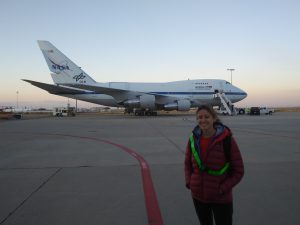
Dr. Nicole Karnath, UToledo alumna and instrument scientist at the SOFIA Science Center in California, stands in front of SOFIA, the world’s largest airborne observatory.
She credits her student research and the support of her advisor Dr. Tom Megeath, UToledo astronomy professor, for the job offer from NASA before she had her diploma.
“I am very happy. I enjoy the science, and I love studying the universe,” Karnath said. “Astronomy is an international, collaborative field because we’re working on telescopes all over the world and taking in huge amounts of data. The opportunities are there for students to break in. UToledo astronomy professors know so many people all over the world. Take advantage of their expertise, connections and need for help analyzing data. That’s how I ended up here.”
“Nicole made one of the most exciting discoveries to come out of our UToledo Star Formation group,” Megeath said. “Just as a talent agent’s biggest dream is to find the actor or actress who will become the next star, for an astronomer, the dream is to find the blob of gas that’s in the process of becoming a star. Nicole has found four such blobs — collapsing gas clouds that are in the first 6,000 years of forming what is called protostar. In ‘star years,’ this is the first 30 minutes of their lives.”
While a graduate student at UToledo, Karnath was part of an international team of astronomers who used two of the most powerful radio telescopes in the world to create more than three hundred images of planet-forming disks around very young stars in the Orion Molecular Clouds.
Pointing both the Very Large Array (VLA) and the Atacama Large Millimeter/submillimeter Array (ALMA) to the region in space where many stars are born, the result is the largest survey to date of young stars, called protostars, and their protoplanetary disks, or planets born in rings of dust and gas.
Among the hundreds of survey images, four protostars looked different than the rest and caught Karnath’s attention.
“These newborn stars looked very irregular and blobby,” Karnath said. “We think that they are in one of the earliest stages of star formation and some may not even have formed into protostars yet.”
It is significant that the scientists discovered four of these objects, which Karnath estimates to be younger than 10,000 years old.
“We rarely find more than one such irregular object in one observation,” said Karnath, who used these four infant stars to propose a schematic pathway for the earliest stages of star formation.
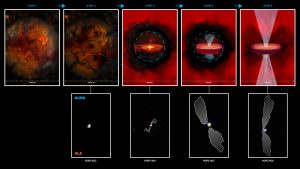
This schematic shows a proposed pathway for the formation of protostars, based on four very young protostars observed by VLA (orange) and ALMA (blue).
Credit: ALMA (ESO/NAOJ/NRAO), N. Karnath; NRAO/AUI/NSF, B. Saxton and S. Dagnello
To be defined as a typical protostar, stars should not only have a flattened rotating disk surrounding them, but also an outflow – spewing away material in opposite directions – that clears the dense cloud surrounding the stars and makes them optically visible. This outflow is important because it prevents stars from spinning out of control while they grow. But when exactly these outflows start to happen, is an open question in astronomy.
One of the infant stars in this study, called HOPS 404, has an outflow velocity of only two kilometers per second, or 1.2 miles per second. A typical protostar outflow has a range of 10-to-100 kilometers per second, or 6-to-62 miles per second.
“It is a big puffy sun that is still gathering a lot of mass, but just started its outflow to lose angular momentum to be able to keep growing,” Karnath said. “This is one of the smallest outflows that we have seen and it supports our theory of what the first step in forming a protostar looks like.”
“These very young protostars don’t match existing theory very well, meaning that we still have a lot to learn from future studies,” Megeath said.
Karnath’s stellar work continues in California at the SOFIA Science Center. SOFIA is a flying observatory made out of a modified Boeing 747, capable of making observations that are impossible for even the largest and highest ground-based telescopes.
SOFIA, which stands for Stratospheric Observatory for Infrared Astronomy, is a partnership of NASA and the German Aerospace Center and under contract with the Universities Space Research Association.
As an instrument scientist, Karnath is responsible for one of five instruments rotated on and off the telescope on the plane, depending on the type of data astronomers are looking to gather.
“I work on an instrument called FORCAST. It’s an imaging instrument and also a spectrometer,” Karnath said. “I’m up there making sure we’re getting the filters needed or the different wavelengths, or looking at a certain target for the right amount of time, and also troubleshooting issues.”
Karnath also is using SOFIA to continue her own research. She submitted a proposal and was awarded observation time on SOFIA scheduled for February 2021.
The curiosity and determination that first fueled her journey as a little girl still powers this successful woman in science today.
“My dad was an amateur astronomer who had a telescope and regularly had me looking at Saturn or a meteor shower,” Karnath said. “I thought astronomy was the most fascinating subject I ever studied. In high school I enjoyed physics and learned that you could make a living off of this. I never looked back, and I’m so lucky that I still love it.”
Karnath said she couldn’t have accomplished so much so soon without the support of Megeath, the UToledo astronomy program, and past advisors at Lowell Observatory and Ohio State University.
“The best part of my job is handing over astronomical data from a cutting-edge observatory, such as the Spitzer Space Telescope, Hubble Space Telescope, ALMA, or the Lowell Discovery Telescope, to a graduate student and seeing the discoveries they make from the data. They never know exactly what they will find,” Megeath said.
“In Nicole’s case, she did an extraordinary job working with an international team spanning three continents and involving universities and institutes across the U.S., Chile and Spain. She combined data from two of the most powerful radio telescopes on Earth to discover these objects. The exciting part is that every discovery brings new mysteries to solve.”
Prior to UToledo, Karnath earned a master’s in applied physics from Northern Arizona University and a bachelor’s in physics and astronomy from Ohio State University.
UToledo is a member of the Association of Universities for Research in Astronomy, a prestigious consortium of 47 U.S. institutions and three international affiliates that operates world-class astronomical observatories for the National Science Foundation and NASA.
Students From Across U.S. to Travel to UToledo for Sales Competition
Tuesday, February 18th, 2020Professional sales students from 36 universities across the United States will visit The University of Toledo’s College of Business and Innovation this weekend to compete in the fifth annual UToledo Invitational Sales Competition.
The sales competition, which features nearly 200 role plays selling a product and more than 300 interviews, will take place Friday and Saturday, Feb. 21 and 22 in classrooms and meeting rooms throughout the Savage & Associates Business Complex. The awards ceremony will occur Saturday afternoon in the Thompson Student Union.
The Edward H. Schmidt School of Professional Sales in the UToledo College of Business and Innovation organizes this first and only national sales competition dedicated exclusively to juniors, sophomores and freshmen because graduating seniors are typically already placed in jobs due to high corporate demand.
Formed in 2000 and endowed in 2002, the Edward H. Schmidt School of Professional Sales believes in transforming the profession of sales by creating knowledge, shaping people and making connections, and the UToledo Invitational Sales Competition is an ideal platform to accomplish just that.
“The UToledo Invitational Sales Competition plays a central role in increasing sales program enrollments nationwide and fueling the tomorrows of future sales leaders and organizations,” said Deirdre Jones, director of the Edward H. Schmidt School of Professional Sales and the UToledo Invitational Sales Competition. “The competition is the conversation starter for universities nationwide to engage early with freshman and sophomore students, and it is also a vehicle for students to pay it forward and shape their leadership skills as a peer coach.”
The first rounds of the competition will take place from 9:15 a.m. to 12:15 p.m. Friday, followed by the wild-card round from 1:45 to 3 p.m. and quarterfinals from 4 to 5:40 p.m. The competition will conclude Saturday with the semifinals from 8:30 to 9:20 a.m. and the finals from 10:30 a.m. to 1 p.m.
Approximately 100 sales leaders and recruiters who participate serve as buyers and judges for the role plays and also interact with the students during coaching and interviewing sessions.
Sponsors include 3M Co., Goodyear Tire & Rubber Co., Mediasite, Rocket Mortgage by Quicken Loans and Polymershapes, among others.
Participating universities that will be in attendance at this year’s event include Kansas State University, the University of Cincinnati, Florida State University, Clemson University, the University of Minnesota and Baylor University. The University of Toledo Edward H. Schmidt School of Professional Sales also will have a team competing.
Chemistry of Chocolate Among Saturday Morning Science Topics
Friday, February 14th, 2020Saturday Morning Science is returning this month to The University of Toledo.
The free, public talks will begin at 10 a.m. in Wolfe Hall Room 1205 on Main Campus.
Another eclectic and cool slate of topics will be explored, according to Dr. Joseph Schmidt and Dr. John Bellizzi, co-directors of Saturday Morning Science.
“There’s really an aspect of randomness to selecting the topics,” Schmidt, professor of chemistry, said. “If it’s something that sounds fun and is even tangentially related to science we’ll do it.”
“We try to do stuff that is on the mind of people in the community as well,” Bellizzi, associate professor of chemistry and biochemistry, added. “For instance, we had someone from Flint come down and talk about clean water.”
Schmidt and Bellizzi would like people to leave these talks with an appreciation and a greater understanding for any given field of science.
Sessions are appropriate for middle school students and older.
Listed by date, Saturday programs and speakers will be:
- Feb. 22: “Glass Is a Verb, and So Are You” by Dr. Jane Cook, director of the College of Earth and Mineral Sciences Museum and Art Gallery at Pennsylvania State University in University Park.
- Feb. 29: “Bon Bon Bon and the Chemistry of Chocolate” by Alexandra Clark, chocolatier and owner of Bon Bon Bon in Hamtramck, Mich.
- April 4: “What’s Happening With Solar Cell Science and Technology These Days?” by Dr. Michael Heben, professor in the UToledo Department of Physics and Astronomy, and Endowed Chair at the Wright Center for Photovoltaics Innovation and Commercialization.
- April 25: “The Science of Jams, Preserves and Marmalade” by Tara Grey, jam maker and owner of Gus & Grey in Detroit.
- May 2: “Life, But Not Alive” by Dr. Kate Adamala, assistant professor of genetics, cell biology and development at the University of Minnesota in Minneapolis.
All talks include complimentary light refreshments donated by Barry’s Bagels. The program is funded by the Office of the Dean of the College of Natural Sciences and Mathematics.
UToledo to Celebrate Engineers Week
Thursday, February 13th, 2020More than 800 local school students will visit The University of Toledo College of Engineering for Engineers Week.
Founded in 1951, Engineers Week will be celebrated Feb. 16-22 across the country and is dedicated to increasing understanding and interest in engineering and technology careers.
This year’s theme is “Be a Pioneer of Progress.”
“I am confident that Toledo’s celebration of Engineers Week is one of the best in the nation, and I am proud to have the College of Engineering play a big role,” Dr. Mike Toole, dean of the UToledo College of Engineering, said. “Almost 250 high school students will join us as an Engineer for a Day, working on hands-on activities to help them learn about the engineering disciplines. And I am proud of our annual award-winning Introduce a Girl to Engineering program, which has grown every year.”
Area high school students will come to campus around 9 a.m. Tuesday, Feb. 18 for Engineer for a Day.
Students will learn about different careers during a tour of UToledo’s engineering facilities and engage in hands-on activities with University students. After lunch, the high school students will shadow a professional engineer in the community.
The UToledo College of Engineering also will host its third annual Introduce a Girl to Engineering Day. More than 600 seventh- and eighth-graders from 16 school districts will visit the University from 9:45 a.m. to 2 p.m. Thursday, Feb. 20.
During the day, the girls will tour UToledo’s engineering facilities and work with engineering students and members from more than a dozen local companies on a variety of activities, including robotics building and testing; traffic design experiments; Lego and balloon cars; rocket building and testing; pipeline design; chemical reactions; highway design; and virtual reality construction programs.
“This event has been built to inspire the next generation of women to pursue careers in STEM fields by working with our UToledo, community and corporate partners to showcase the many ways engineers impact our daily lives,” said Bryan Bosch, manager of diversity, inclusion and community engagement initiatives in the UToledo College of Engineering. “We’re excited to have such a large group on campus this year from so many of our area school districts.”
UToledo Spotlights Unlikely Friendship Sparked by Landmark Same-Sex Marriage Case
Thursday, February 6th, 2020The U.S. Supreme Court legalized same-sex marriage five years ago in its landmark “Obergefell v. Hodges” case.
Next week the named parties on opposing sides of one of the most important Supreme Court rulings in recent history will be at The University of Toledo to discuss the case and their resulting friendship.
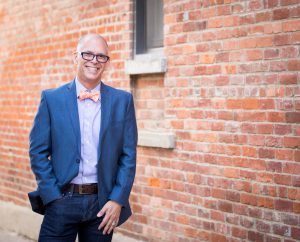
Jim Obergefell
Jim Obergefell, the plaintiff who sued the state of Ohio for refusing to recognize his marriage on his husband’s death certificate, and Rick Hodges, the defendant and UToledo alumnus who served as director of the Ohio Department of Health at the time of the case, will take the stage for “Finding Friendship in a Contentious Place: A Conversation with Obergefell and Hodges from the Landmark U.S. Supreme Court Case on Same-Sex Marriage” 6 p.m. Thursday, Feb. 13 in the Doermann Theatre.
Benjamin Barros, dean of the UToledo College of Law, will moderate the free, public event presented by The University of Toledo Law Review.
Rob Salem, professor and dean for diversity and inclusion at the College of Law, will provide legal commentary of the challenges same-sex couples still face five years after the decision.
“We’re honored to host these guest speakers not just because of their prominent role in a landmark Supreme Court case, but because they embody the spirit of civility and celebration of differences,” Salem said.
Jim Obergefell works as an LGBTQA+ activist and serves on the Board of Directors for Services and Advocacy for GLBT Elders, the oldest and largest national non-profit organization that advocates for and provides services for LGBTQA+ older Americans. Obergefell co-authored the book “Love Wins” with Pulitzer Prize-winning investigative journalist Debbie Cenziper.
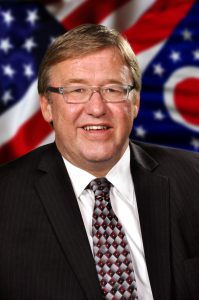
Rick Hodges
Rick Hodges is an executive in residence and visiting professor at Ohio University. He also is the director of the Ohio Alliance for Innovation in Population Health. Hodges is a former member of the Ohio House of Representatives. He earned his master’s degree in public administration from UToledo in 1991.
For those unable to attend, the event will stream live at toledoalumni.org/events/law-finding-friendship.html.
Volunteers at UToledo to pack more than 200,000 meals to feed families
Thursday, February 6th, 2020For the fourth consecutive year, volunteers will gather in shifts and give back at The University of Toledo by assembling nearly a quarter of a million meals to feed families around the globe on Friday and Saturday, February 7-8, in the Health Education Building on Main Campus.
The two-day mobile pack, part of the Feed My Starving Children program, is organized by 100 UToledo students who are members of the Klar Leadership Academy in the College of Business and Innovation. The academy was founded in 2015 with the support of Steven Klar, a 1971 UToledo business alumnus and a New York City builder and real estate developer.
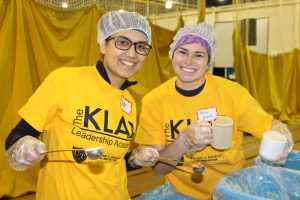 More than 1,100 UToledo students, employees and alumni, as well as teams from companies around Toledo, will invest some of their free time to split into groups to assemble nutritious rice meals with vegetable blend, vitamins and minerals. The meals are scientifically formulated for undernourished children.
More than 1,100 UToledo students, employees and alumni, as well as teams from companies around Toledo, will invest some of their free time to split into groups to assemble nutritious rice meals with vegetable blend, vitamins and minerals. The meals are scientifically formulated for undernourished children.
The organizers raised $48,000 and have a goal to build over 208,000 meals. Last year, volunteers packed 202,000 meals.
“The University of Toledo has a global impact, and the students are the driving force behind this incredible initiative to fight hunger worldwide,” said Dr. Clint Longenecker, Distinguished University Professor at the UToledo College of Business and Innovation. “This is a very compelling feel-good story of Toledoans coming together to positively impact the lives of those in destitute countries.”
The shifts will take place from 3 to 5 p.m. and 7 to 9 p.m. Friday, February 7th, and from 9 to 11 a.m. and noon to 2 p.m. Saturday, February 8th.
The over-arching goals of The Klar Leadership Academy are to provide its student participants with a transformational learning experience to build on their University of Toledo education so to enable them to better lead themselves, others, teams, organizations, communities and change the world for good.
NAACP Division Director to Speak at UToledo for Black History Month
Thursday, January 30th, 2020Activist Tiffany Loftin, director of the NAACP Youth and College Division, will talk about advocacy and empowerment for communities of color when she visits The University of Toledo for Black History Month.
She will speak 7 p.m. Thursday, Feb. 6 in Doermann Theatre.
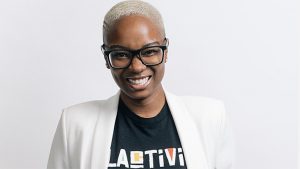
Tiffany Loftin
For the NAACP, Loftin serves more than 700 youth councils and high school and college chapters fighting for civil rights. She is known for her passion for membership-based organizing at the local, state and national levels.
She believes her mission is to develop students into leaders who can stand up for what they believe in.
“My first value in this work is to make sure that our young people are treated as respectable young adults,” Loftin said during an interview with The Crisis Magazine. “Our young folks are more woke, taking more risks, and having more important conversations at a younger age that a lot of us didn’t have to have when we were young.”
“We are excited Tiffany Loftin is coming to campus to give our keynote address during Black History Month,” David Young, UToledo director of Toledo Excel and Special Projects, said. “She is a dynamic leader, and we expect her to fire up our students to get involved and make a difference in the fight for equality.”
Prior to joining the NAACP last February, Loftin was senior program specialist in community advocacy and partnership engagement at the Center for Social Justice with the National Education Association. Her responsibilities included aligning the association’s priorities within the African-American and progressive communities and creating opportunities to address racial and economic gaps that affect educators, students and communities.
She also worked for the AFL-CIO Labor Commission on Racial and Economic Justice and served as racial justice program coordinator for the Civil, Human and Women’s Rights Department, where she focused on creating dialogue and action addressing the racial and economic disparities impacting workers.
When Loftin was 24 in 2013, President Barack Obama appointed her to serve on the White House Initiative on Educational Excellence for African Americans in Higher Education.
In 2011, Loftin became the first person in her family to graduate from college when she received dual degrees in American studies and political science from the University of California at Santa Cruz. She became president of the U.S. Student Association, the largest student-led organization in the nation that represents student governments and students, and coordinated campaigns addressing student loan debt and expanding financial aid for low-income and students of color.
In addition to Loftin’s free, public talk, the University will pay tribute to this year’s theme, “Celebrating Resilience,” with several events during Black History Month. Listed by date, events will include:
- Tuesday, Feb. 4 — Black History Month Basketball Game, 7 p.m., Savage Arena. Catch the Toledo men’s basketball team playing Northern Illinois; during the game, student organizations, alumni and students who exemplify excellence will be recognized.
- Saturday, Feb. 8 — “Reclaiming Our Narrative: Ending the Epidemic,” 4 p.m., Collier Building Room 1000 on Health Science Campus. International HIV activist Hydeia Broadbent will speak in honor of National Black HIV/AIDS Awareness Day. The free, public program is presented by the Ann Wayson Locher Memorial Fund for HIV Care and the UToledo Office of Diversity and Inclusion.
- Tuesday, Feb. 18 — Black Career Night, 6 p.m., Thompson Student Union Ingman Room. This event sponsored by the Black Student Union will bring together local community members who will talk about their businesses and organizations and allow students to network and learn about career opportunities.
- Friday, Feb. 21 — Black Student Union Fashion Show, 7 p.m., Thompson Student Union Auditorium. Ticket prices to be announced. Proceeds from the 51st annual event go to a student scholarship that aids in the retention of black students.
- Tuesday, Feb. 25 — “Honing in on Triple Negative Breast Cancer: Improving Health Outcomes for Women of African Ancestry Using Precision Medicine,” 5:30 p.m., Health Education Building Room 105 on Health Science Campus. The free, public forum is hosted by the Catharine S. Eberly Center for Women.
- Saturday, Feb. 29 — Ujima Day of Service, 10:30 a.m. Volunteers will meet in Thompson Student Union Room 2500 for breakfast and then volunteer at the MLK Kitchen for the Poor, the Ronald McDonald House and the Beach House Family Shelter. Ujima is one of the seven principles of Kwanza and stands for collective work and responsibility. “Ujima means to build and maintain our community together and to make our brother’s and sister’s problems our problems and to solve them together,” Young said.
UToledo Law Scholar’s New Book ‘Originalism’s Promise’ Illuminates the Constitution
Thursday, January 23rd, 2020In the midst of President Donald Trump’s impeachment trial and heading into the 2020 presidential election, a constitutional law scholar at The University of Toledo released a new book providing the first natural law justification for an originalist interpretation of the American Constitution.
In “Originalism’s Promise: A Natural Law Account of the American Constitution” published by Cambridge University Press, Lee Strang, John W. Stoepler Professor of Law and Values in the UToledo College of Law, provides a summary of the history of constitutional interpretation in the U.S. and writes a thorough and detailed description of how originalism operates in practice.
“This book provides an argument for how Americans should interpret the Constitution and offers a way out of the bitterness exemplified by the confirmation hearings for Supreme Court Justice Brett Kavanaugh,” Strang said. “Faithfulness to the Constitution’s original meaning is supported by sound reasons, reasons that help all Americans achieve their own human flourishing.”
The College of Law is celebrating the book’s release with a book launch that features a lecture by Strang at noon Wednesday, Jan. 29 in the Law Center McQuade Auditorium. The free, public event will be followed by a book signing.
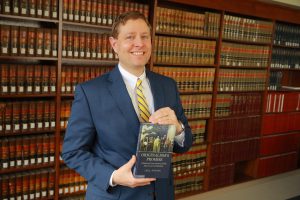
Lee Strang
Strang, who was a visiting fellow at the James Madison Program at Princeton University during the 2018-19 academic year, has published dozens of articles in the fields of constitutional law and interpretation; property law; and religion and the First Amendment.
“In this presidential election year, my goal is to inform Americans as they debate the Supreme Court’s future,” Strang said. “‘Originalism’s Promise’ is the product of more than 20 years of thinking through two common American commitments. First, Americans strive to be faithful to our Constitution. Second, and following the Declaration of Independence, many Americans are committed to some version of natural law. Together, these commitments suggest that Americans of all stripes should utilize originalism to interpret our common Constitution.”
The UToledo College of Law awarded Strang the Faculty Scholarship Award in 2019 for “Originalism’s Promise.” He was the recipient of The University of Toledo Outstanding Faculty Research and Scholarship Award in 2017.
In 2015 Strang served as a visiting scholar at the Georgetown Center for the Constitution.
Strang said the inspiration for writing the book stems from his experiences as a younger person attending political events with his parents, his education as a law student, and how vigorously Americans disagree about how to interpret the Constitution.
“I listened as politicians and activists argued that the Constitution supported their positions, so this book grew out of an attempt to identify how Americans can ascertain which claims are correct,” Strang said. “Also, as a student taking constitutional law classes, we did not study the Constitution’s text, structure and history. I remember we nearly always read Supreme Court opinions, which themselves rarely paid attention to the Constitution’s text. This book both criticizes and supports aspects of that educational approach.”
UToledo to spotlight sustainable energy program that repurposes nuclear reactors for hydrogen production
Monday, January 13th, 2020The University of Toledo College of Engineering is hosting a workshop to showcase a national program designed to use the nation’s commercial nuclear reactors to produce hydrogen and help the transportation, chemical and steel industries close the carbon cycle.
The event, focused on the sustainable energy program, starts at 8:30 a.m. Tuesday, Jan. 14 in the Nitschke Hall SSOE Seminar Room, bringing together representatives from the U.S. Department of Energy, scientists from U.S. national laboratories, UToledo faculty, representatives from Davis-Besse nuclear power plant, and industry leaders.
As part of the national project funded by the U.S. Department of Energy, Idaho National Laboratory is working with the Davis-Besse nuclear power plant on a pilot program to install an electrolysis system to produce hydrogen.
“The University of Toledo is proud to host a workshop to explore opportunities in repurposing light water nuclear reactors for hydrogen production through a hybrid systems design,” said Dr. Mike Toole, dean of the UToledo College of Engineering.
“The project is a win for regional industries and clean energy,” Dr. Connie Schall, UToledo associate vice president for research, said. “Nuclear electricity is a low carbon emission power source. The nuclear energy hub model opens many opportunities for regional industries, not only for green hydrogen but also for other electrochemically driven processes.”
This workshop will explore the current state-of-the-art opportunities for industry, government and academic collaboration, identify current research-and-development gaps, and provide an overview of the U.S. Department of Energy programs that are leading the effort to build a hydrogen economy and innovative power grid solutions.
The agenda and registration information can be found at the workshop website.
The workshop comes three months after the U.S. Department of Energy selected UToledo to host National Lab Day, which connected students and researchers with preeminent scientists from world-class facilities across the country to explore opportunities for partnerships.
One of Exonerated Central Park Five to Speak at Conference for Aspiring Minority Youth
Tuesday, January 7th, 2020Dr. Yusef Salaam, whose story is documented in the 2019 series “When They See Us,” will give the keynote address at The University of Toledo’s 36th annual Conference for Aspiring Minority Youth Saturday, Jan. 11.
Sponsored by Toledo Excel and the UToledo Joint Committee, the conference for seventh- and eighth-graders, high school students and parents will start at 8:30 a.m. in the Thompson Student Union Auditorium.
“Social Justice: A Community Enterprise” is the theme of this year’s event.
“Dr. Salaam understands better than most that we have systems in this country that do not work equally for all of its citizens,” David Young, director of Toledo Excel and Special Projects, said. “However, he has dedicated himself to changing those systems as one of the leading advocates in the nation for criminal justice reform and change.”
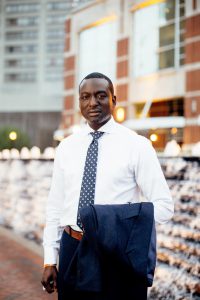
Dr. Yusef Salaam
Salaam was one of five teenagers of color, ages 14 to 16, wrongfully convicted of the 1989 beating and rape of a female jogger in Central Park. More than a decade later, a murderer and rapist serving a life sentence confessed to the brutal crime, and DNA evidence cleared the five, who were exonerated.
In 2012, filmmaker Ken Burns made a documentary detailing the travesty; “The Central Park Five” chronicled the case from the perspective of the teens whose lives were changed by the miscarriage of justice.
Two years later, the quintet agreed to an approximate $40 million settlement from New York City to resolve the civil rights lawsuit over their arrests and imprisonment for the attack that made headlines around the globe.
Their story continues to educate and open eyes. “When They See Us,” a four-part miniseries was released this year by Netflix and has received numerous awards.
“Since the day we were wrongfully arrested, others controlled the story about us without ever seeing us,” Salaam, an Innocence Project board member, said at the nonprofit legal organization’s 2019 gala.
Since his release more than two decades ago, Salaam has become an activist and inspirational speaker who addresses injustice and the importance of education, and facilitates discussions on race and class, prison reform, and capital punishment.
“This conference will educate students and parents about their basic rights and also advocate all attendees to be change agents where needed,” Young said. “We hope this will encourage a community and collective effort where social justice is needed.”
Following the keynote address, Salaam will participate in a panel discussion on social justice and criminal justice reform. He will be joined by RaShya Ghee, UToledo graduate, adjunct professor at the UToledo College of Law, and staff attorney at Advocating for Opportunity; Albert Earl, cultural educator and prevention education specialist; and UToledo Police Chief and Director of Public Safety Jeff Newton. Rhonda Sewell, manager of external and governmental affairs at Toledo Lucas County Public Library, will moderate the session.
Toledo Excel was established in 1988 to help underrepresented students, including African, Asian, Hispanic and Native Americans, for success in college. Through summer institutes, academic retreat weekends, campus visits and guidance through the admission process, students increase their self-esteem, cultural awareness and civic involvement.
Toledo Excel is part of the Office of Multicultural Student Success, which is in the Division of Student Affairs. The UToledo Joint Committee includes representatives from the University, Toledo Public and Parochial schools, and civic and community leaders from the city of Toledo. The mission of the committee is to bring together people in the community interested in the education of underrepresented youth. The UToledo Joint Committee also serves as an advisory board and support system for Toledo Excel.
Advance registration for the free, public conference is required; go to the eventbrite website.

